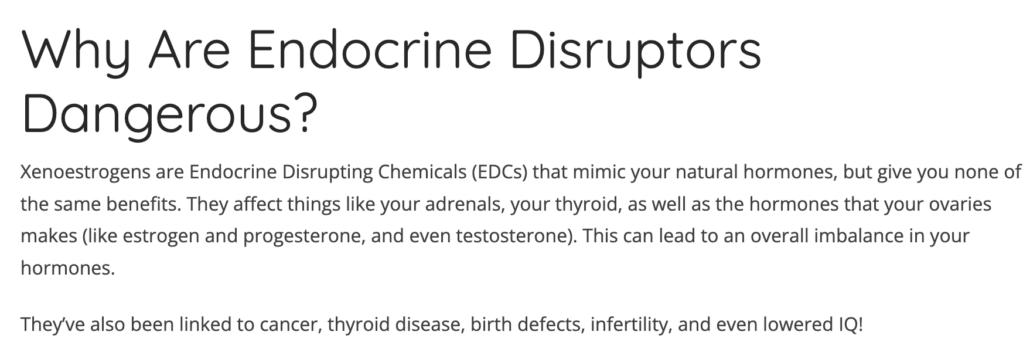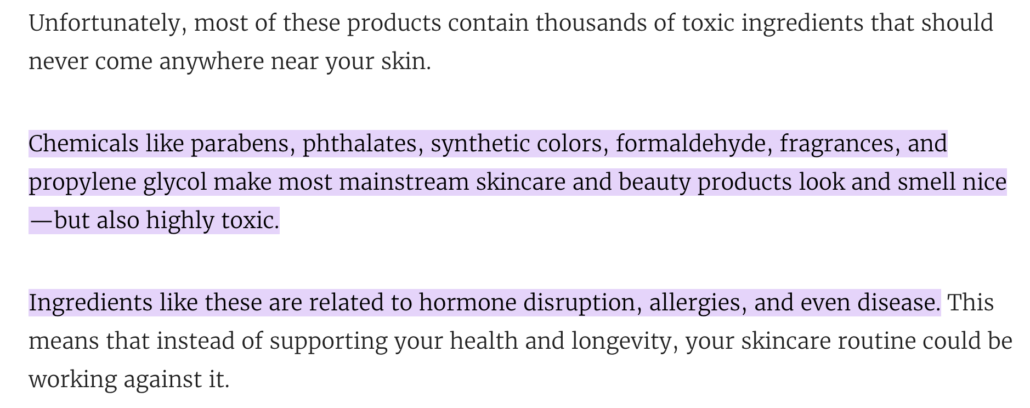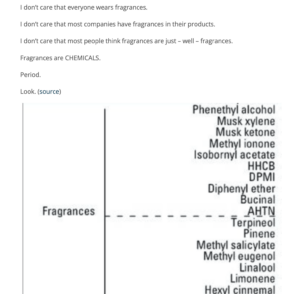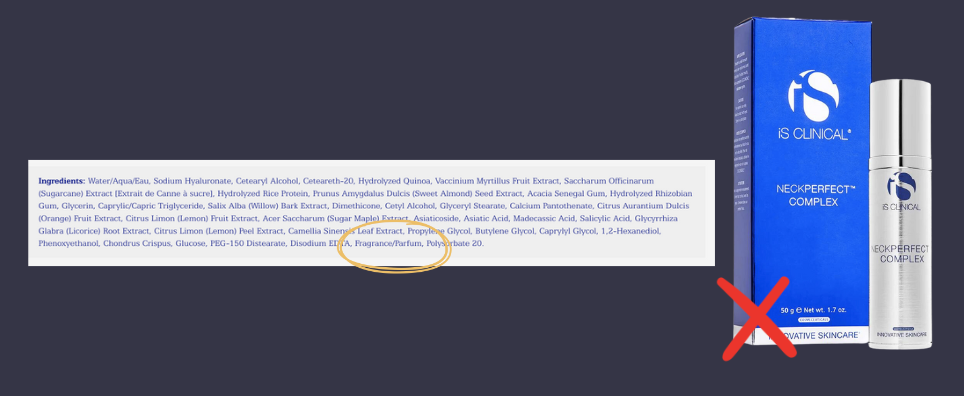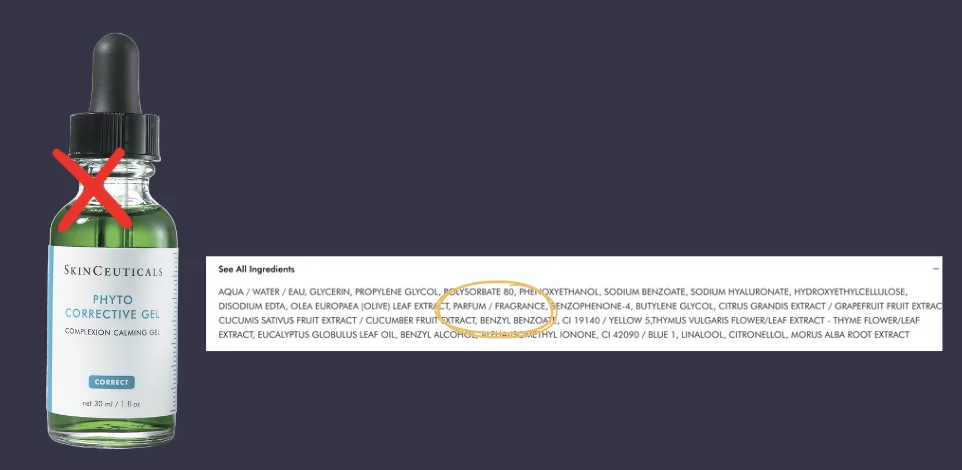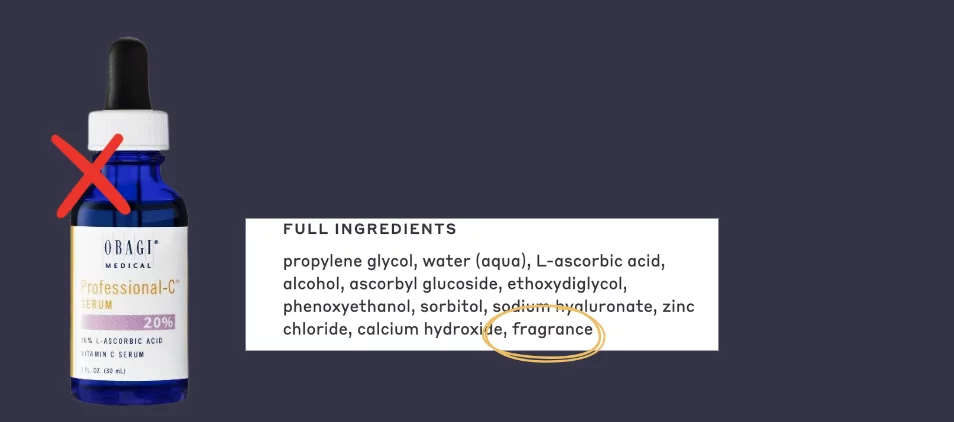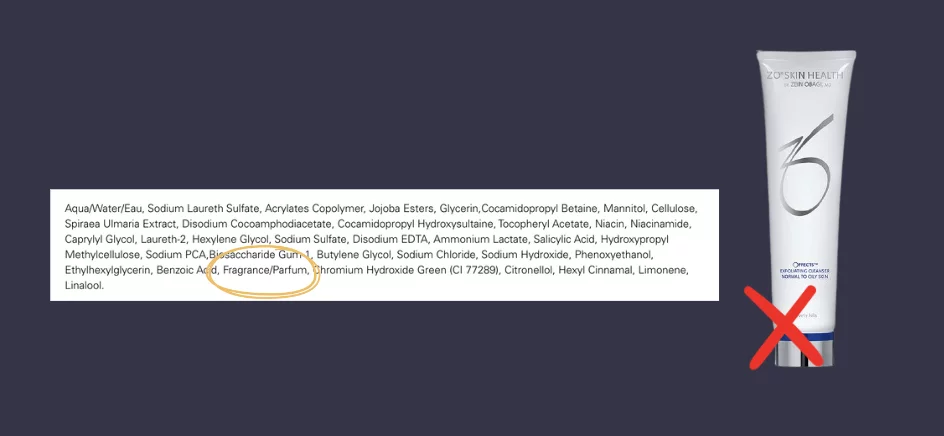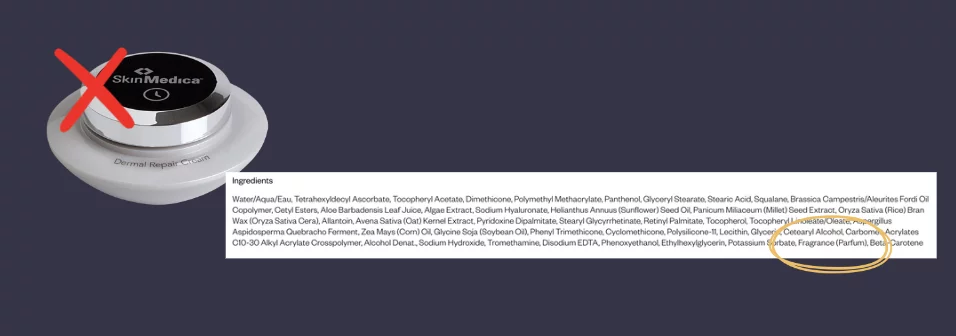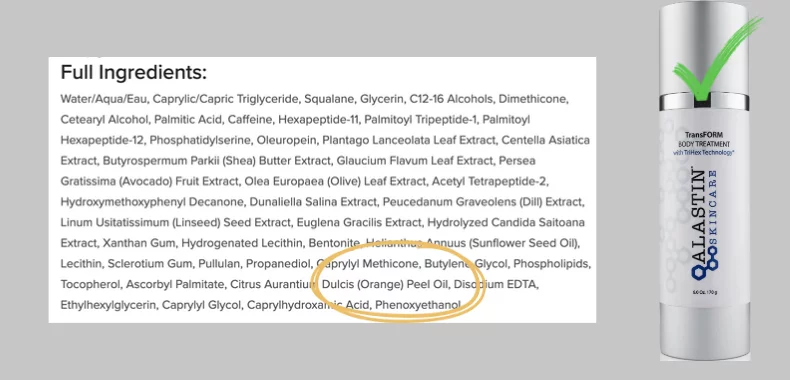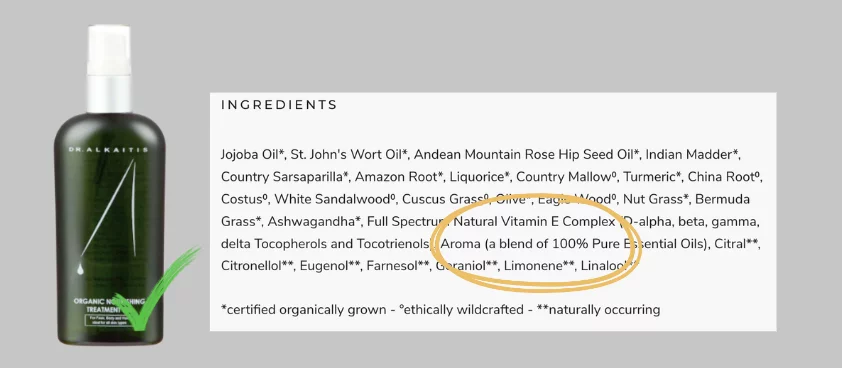Recognizing Toxins in Skincare
/in EMA Spotlight /by Mary Beth MartinIntroduction
More and more in today’s society, we all have to be our own advocates to ensure that the products we are using on our bodies and in our homes are safe. Many of us have taken to reading every label and ingredient before buying. However, when something is purchased in a medical office, like a Medical Spa, many people just assume that because it is “medical” it is automatically safe and non-toxic.
We have to remember that every skincare line, medical grade or not, is for profit and they often have non-medical or non-science based people on their boards making decisions on where to save money. Skincare ingredients are also highly unregulated as the FDA allows over 3,000 chemicals to be masked under the terms “fragrance” or “parfum” alone.
We recently went through months of back and forth with various companies trying to get them to be transparent about exactly what chemicals and ingredients they use under the blanket terms “fragrance” or “parfum” and we were hit over and over with the non-answer that it was “proprietary information”.
In our opinion, people have the right to know what they are putting on their bodies that could harm their health. So we refuse to buy products with these ingredients. However, companies will only change their behavior if the consumer demands they do or they take a hit to their bottom line, because people ARE becoming more aware.


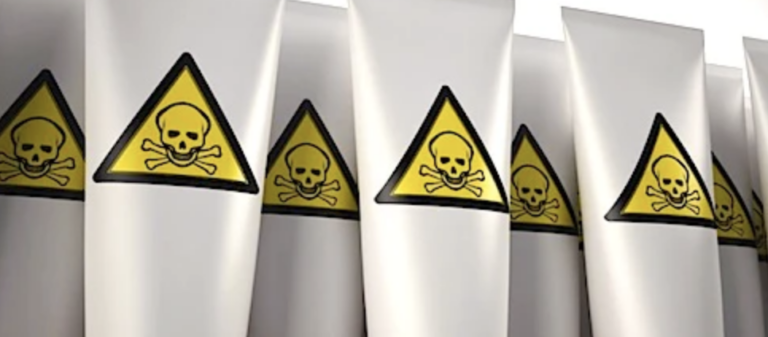
Table of Contents
What's the easiest toxin to recognize in skincare?
The easiest toxin to recognize, and therefore avoid, in skincare is “fragrance/parfum”.
Any ingredient labeled “fragrance” or “parfum” is a blanket term that represents OVER 3,000 toxins that do not have to be recorded or reported. Source link for statistic found HERE. These chemicals include toxins, endocrine distruptors (hormone distruptors), carcinogens, allergens and more!

Why does it matter?
The skin is the largest organ in the body and is absorbing whatever we put on it. Smells (aka fumes) are also inhaled and can cause other symptoms such as headaches and breathing issues. the fumes we are inhaling also absorb through our nasal and lung mucosa and can act systemically throughout the body.
Not only is this unethical, in our opinion, but also harmful to our overall health if companies do not disclose exactly what is in a product we use every day! We understand companies have a right to their proprietary information, but no one can replicate their product without exact ingredients AND proportions. So…why not disclose the exact ingredients unless they have something to hide?
Are fragrances unnecessary in skincare products?
Yes, fragrances are completely unnecessary to have in skincare products. These toxins only provide a scent or smell to products, they do not actually give a purpose to the product formulation. As above, while there are some ingredients that may not be as “pure” in skincare, they may be needed in order to create a lather, sud, or provide a barrier for hydration.

⭐️ Overall, fragrances or parfum are NOT needed for any functionality of the product…so why are they put in there?!
How are fragrances endocrine disruptors?
When toxic fragrances are inhaled or absorbed in the skin, they mimic our delicate endocrine system by interfering with healthy hormone functions as well as the release of hormones in our body.

Below are additional medical sources that explain how toxic skincare ingredients can be harmful to our health/hormones:
Here is a short explanation, from Dr. Jolene Brighton Hormone Expert, as to why endocrine disruptors like fragrances and parfumes are toxic to our health/hormones.
Another example from Dr. Mark Hyman about how toxins (fragrances) in our skincare are related to many hormone and health issues.
Dr. Ben Lynch explains in this diagram how fragrances are considered chemicals to our bodies. They rank with some of the most dangerous chemicals.
What are common health-related symptoms fragrances cause?
A few, but not all symptoms that are common from toxic fragrances include the following:
- Unbalanced hormone levels
- Headache, nausea, brain fog, or just feeling “off”
- Thyroid complications
- Negative impact on fertility (both men & women) and women’s cycles
- Skin concerns: acne, dermatitis, eczema, rashes
- General allergic reaction
These symptoms arise from topical absorption of toxins in our bloodstream, as well as inhaling the fragrances. Many people may not notice any negative symptoms from products with fragrances right away, but the daily (or even twice daily) use of these products accumulate overtime, increasing our toxic load (more below), which then leads to the negative symptoms.

Does medical grade skincare have fragrance in it?
Yes, many “medical grade” skincare products have fragrance in them. However, this it not to say that ALL medical grade skincare has fragrance in it. That is why it is important as a consumer, to read ingredient labels before purchasing skincare (or any product). It is such a bummer that clients come to medical offices trusting that medical grade skincare is a better option for them, when in reality it can be filled with these unnecessary toxins.

Examples of a FEW medical-grade skincare products with fragrances:
Below you can see many popular medical grade skincare brands that have fragrance listed in their ingredient list. This was from a very LIGHT search for fragrances in commonly used and sold skincare in the aesthetic industry. We are not trying to bash any one brand, but simply want to shed light on how common these toxic ingredients are. That way you can learn to be your own advocate if your medical spa does not carry options without known fragrances or parfum in them.
Again, fragrance and parfum are 100% non essential to the product working and only cause harm to ones health.
⭐️ Each product listed below has the official ingredient list with a circle around “fragrance/parfum” listed. You can also view the product ingredient list with the source link provided.
Is Clinical Perfect Neck Correct:
SkinCeuticals Phyto Corrective Serum:
Obagi Professional C Serum 20%:
Zo Skin Health Exfoliating Cleanser:
Skin Medica Dermal Repair Cream:
Trying to get companies to disclose ingredients:
Topix Skincare:
In our office at Elite, we have carried a private label skincare line, Topix, for a few years now. Previously they really marketed themselves as “clean”, “hypoallergenic”, “fragrance free” and heavily researched. Unfortunately over the years we have received many products that contain fragrance when we were told they were fragrance free, or they now have fragrance in them when previously they did not.
The sales reps were clearly naive to the dangers of the blanket terms “fragrance” and “parfum” and during our back and forth made several claims that ended up being false. Including that they only had 5 skus with fragrance and no parfum (they have both and there are over 15 now). They also claimed that none of their ingredients were toxic because they were prescription strength.
As someone with a license to prescribe, Ali-NP countered that many many prescriptions contain toxins and other unnecessary ingredients. Otherwise why would some prescription pills have bright artificial colors and why would creams contain fragrance and other additives and preservatives (see chart below for full source)?
Ali asked several times for the exact ingredients and was told over and over they would not tell her because it was “proprietary information”.


Is prescription strength skincare non-toxic?
No, prescription strength skincare is not necessarily non-toxic. Just because a skincare product is prescription strength, does not mean it is non-toxic! There are many additives in prescription strength skincare that can be toxic to our health and hormones, too. Below are just a few examples of common additives in these types of products we get from Doctors and Dermatologists for our skin concerns 👇
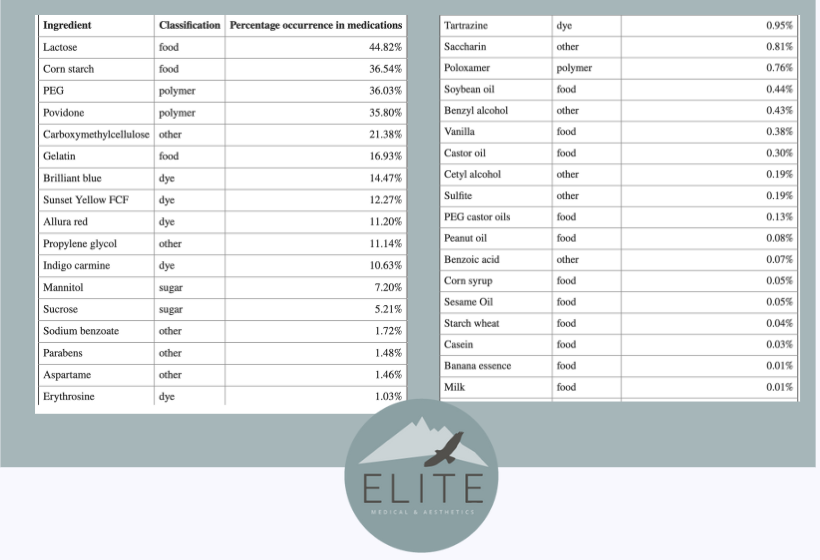
Again, most of these additives are unnecessary ingredients needed for skincare products to do their job.
Link to read entire study below.
Please Do BETTER!
From a few of our personal encounters with this issue, it is known that these medical companies need to do better! Like mentioned earlier, we feel it is unethical to promote a product as “medical grade” or “clean” and then hide toxins under the terms “fragrance” and “parfum”. Consumers deserve to know what they are using on their skin, bottom line. The only way for change is to call these companies out and stop purchasing their products…it should not be a mystery for anyone.
What are some non-toxic skincare options?
At Elite, we want to give a shout-out to skincare brands like Alastin Skincare and Dr. Alkatis Skincare who are transparent with their ingredient lists and avoid toxic fragrances. We will continue to carry and support skincare lines like this because they clearly state on their ingredient labels where the scent of the product is coming from.
- For example: “Fragrance from orange oil” or “Orange essential oil” are not blanket terms for “fragrance” 👇
Alastin TransFORM Body Cream:
Dr. Alkatis Organic Nourishing Oil:
Toxic Cup Example:
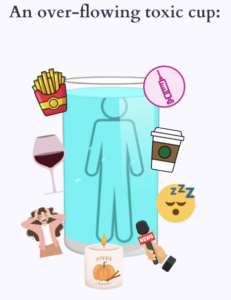
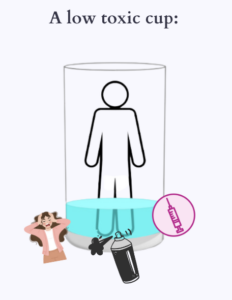
Above is an image demonstrating two different types of “toxic cups” that represent the toxic overload in our bodies.
1. Many different lifestyle factors can create an over-flowing toxic cup such as:
- Alcohol consumption, unfiltered/tap water, fast food, abundant stress, sugary caffeine drinks, not exercising, limited sleep, excessive news/consumption of media, dehydration, exposure to fragrances, toxic household supplies, etc.
2. Someone with a low toxic up usually finds themselves prioritizing their health in ways like:
- Meditation, organic/balanced diet, hydration, managed stress levels, detoxification practices, adequate sleep, proper gut health, exercise, spending time outside, avoid toxic personal/hygiene products, etc.
When someone is exposing themselves to excess toxins every day, their toxic cup eventually overfills and negative health symptoms may arise. If a person with a full toxic cup comes in for an elective procedure such as botox or fillers, negative side effects and adverse reactions are more likely to happen. Versus someone with a low toxic cup can handle a few “toxins” much better and safer (i.e. botox quarterly or lip filler yearly), because there are less toxins for their body to manage.

Why does this matter?
We bring this up because we are seeing social media flooded with reels/posts similar to the one here.
While we understand the humor in it, we also want to make a point that it is VERY important to live a healthy lifestyle for anyone doing elective procedures. It’s controversial but aesthetic treatments, or any elective treatments (think tattoos, hair chemical treatments, etc.), are less likely to cause problems for someone with a low “toxic cup” (see figure above).
People that have a high toxic cup and don’t get any elective treatments also aren’t necessarily healthier either (in our humble opinion). Eating fast food, wearing tons of artificial fragrances and drinking tap water could very likely be more harmful to health overtime compared with getting injections quarterly or yearly.

Bottom Line:
- What we put on our skin daily affects our hormones and our health
- Just because something is labeled as “Medical Grade” or “Prescription Strength” does not make it non-toxic
- Just because someone works for a skincare company doesn’t mean they know what is in their products or why (i.e. you can’t just trust what a sales rep tells you)
- YOU have to advocate for yourself by reading ingredients and choosing safer products
- It matters because your toxic load (toxic cup level) can greatly affect your overall health
- Getting any elective procedure could increase stress or “toxic load” so it is important to live a healthy lifestyle
- Go to a medical provider that cares about overall health to keep toxic load down if you choose to have any elective treatment
Elite Medical & Aesthetics is a premier med spa located in Lone Tree, CO. Our staff of Nurse Practitioners provide a holistic approach for natural results with safety as a #1 priority.

